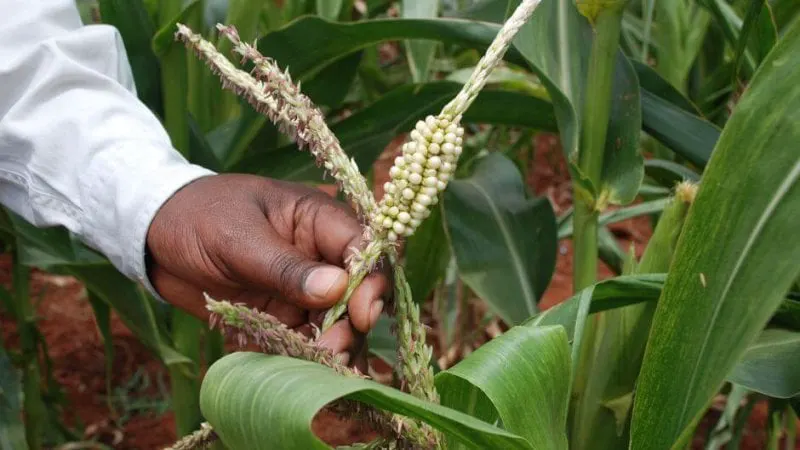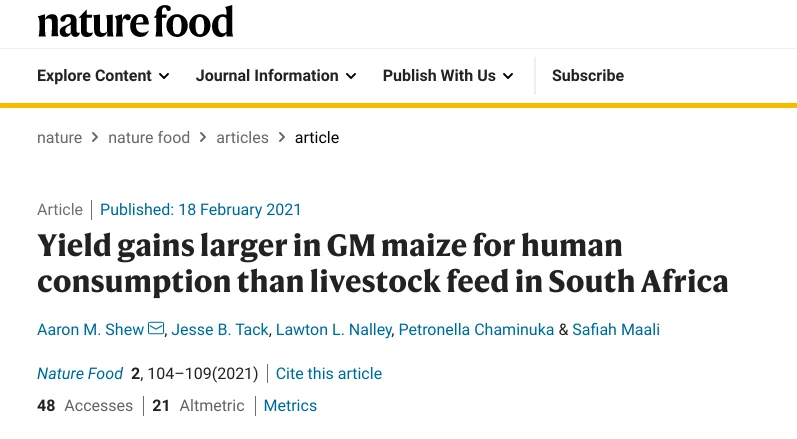GM crops could support food security in Africa, new study suggests
GM crops could support food security in Africa, new study suggests


“Our study shows that the gains from biotechnology for white maize as a staple food crop in South Africa have been greater than for yellow maize for livestock feed,” said lead author Dr. Aaron Shew, an assistant professor of agricultural economics at Arkansas State University. “This could signal substantial potential to improve production of other staple crops in Africa with biotech tools.”

Shew noted that “the yield gains for white maize were about twice that of yellow maize, which suggests genetic modification may act as a ‘catch-up’ technology to more rapidly address production issues. We also found that the yield gains were similar in dryland production — not just irrigated — which may be important for climate resilience.”
The study, published in the journal Nature Food, found that GM maize improved yields by 8 percent on average while GM white maize yield gains were more than double GM yellow maize gains.

Researchers conducted the study to determine whether GM crops actually benefit consumers via increased yields in light of widespread skepticism about that assertion. White maize, which is predominantly a field-to-plate crop in South Africa, provided a medium for testing the potential impact of GM crops on the human food supply.
The study assessed yield differences between GM white maize, GM yellow maize and conventional hybrid (CH) maize over a 28-year period across 106 locations in South Africa. The data used in the study goes back to 1980. GM cultivars represented just 5 percent of the observations in 1999, when South Africa introduced insect-resistant Bt maize, but that figure progressively increased to 63 percent by 2009, suggesting widespread farmer adoption of the technology.
It tallied data from 491 cultivars and 49,335 dryland and 9,617 irrigated observations in the southern African country, which is considered a regional leader in commercial and mechanized farming. The data used in the study are believed to represent the most extensive field trials conducted on GM crops in the African continent.
Notable observations in the study include a yield increase in dryland GM maize, which is important because much of Africa’s agriculture depends on rainfall rather than irrigation. The yields for irrigated maize were more than 2 Mt per hectar higher than those achieved in dryland maize. GM white maize yield gains were approximately twice as large as those for yellow maize.
The study also found large differences in yields gains across the eight provinces studied, “which may suggest that genetic modification holds greater potential for intensifying production in marginal or small-holder production where lower potential for extensification exists.”
The study suggests that GM maize may improve climate change adaptation strategies, support producers in both high and low-production areas and bolster food security in the case of white maize consumption in South Africa.
The authors outlined some of the salient merits of GM crop technology, citing increased yields, reduced cost of production or a combination of the two as incentives for the producer.
“Empirical evidence further suggests that the producers who have benefited the most from genetic modification are in fact low-income farmers in developing countries where there are fewer options for pest management and crop vulnerability tends to be higher,” the authors wrote.
“As new biotech tools are developed, tested and approved, we hope these findings encourage education, policy support and economic access to biotech staple crops where producers need them most, in South Africa and more broadly in sub-Saharan Africa,” Shew said.
The authors anticipate that future research could focus on the difference in yields between GM and CH white maize grown on smallholder farms and the contribution of GM maize to farm-level economic and food security benefits.
Dr. Joseph Maina is a Senior Lecturer in the Department of Earth and Environmental Sciences at Macquarie University. Joseph’s ultimate goals are to understand and predict the impacts of environmental variability and change on social and ecological systems at local and global scales to support spatial planning & management.
A version of this article was originally posted at the Cornell Alliance for Science and has been reposted here with permission. The Cornell Alliance for Science can be found on Twitter @ScienceAlly

 | Videos | More... |

Video: Nuclear energy will destroy us? Global warming is an existential threat? Chemicals are massacring bees? Donate to the Green Industrial Complex!
 | Bees & Pollinators | More... |

GLP podcast: Science journalism is a mess. Here’s how to fix it

Mosquito massacre: Can we safely tackle malaria with a CRISPR gene drive?

Are we facing an ‘Insect Apocalypse’ caused by ‘intensive, industrial’ farming and agricultural chemicals? The media say yes; Science says ‘no’
 | Infographics | More... |

Infographic: Global regulatory and health research agencies on whether glyphosate causes cancer
 | GMO FAQs | More... |

Why is there controversy over GMO foods but not GMO drugs?

How are GMOs labeled around the world?

How does genetic engineering differ from conventional breeding?
 | GLP Profiles | More... |

Alex Jones: Right-wing conspiracy theorist stokes fear of GMOs, pesticides to sell ‘health supplements’




 Trust issues: What happens when therapists use ChatGPT?
Trust issues: What happens when therapists use ChatGPT? Fighting deforestation with CO2: Biotechnology breakthrough creates sustainable palm oil alternative for cosmetics
Fighting deforestation with CO2: Biotechnology breakthrough creates sustainable palm oil alternative for cosmetics California, Washington, Oregon forge immunization alliance to safeguard vaccine access against federal undermining
California, Washington, Oregon forge immunization alliance to safeguard vaccine access against federal undermining Viewpoint — Fact checking MAHA mythmakers: How wellness influencers and RFK, Jr. undermine American science and health
Viewpoint — Fact checking MAHA mythmakers: How wellness influencers and RFK, Jr. undermine American science and health 30-year-old tomato line shows genetic resistance to devastating virus
30-year-old tomato line shows genetic resistance to devastating virus Viewpoint: Video — Big Solar is gobbling up productive agricultural land and hurting farmers yet providing little energy or sustainabilty gains
Viewpoint: Video — Big Solar is gobbling up productive agricultural land and hurting farmers yet providing little energy or sustainabilty gains The free-range chicken dilemma: Better for birds, but with substantial costs
The free-range chicken dilemma: Better for birds, but with substantial costs ‘You have to treat the brain first’: Rethinking chronic pain with Sanjay Gupta
‘You have to treat the brain first’: Rethinking chronic pain with Sanjay Gupta
